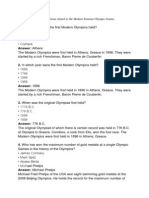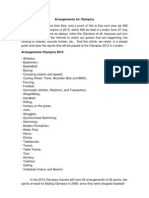0 ratings0% found this document useful (0 votes)
29 viewsOlympics
Olympics
Uploaded by
Swiss KhanThe document provides information about the history and key aspects of the Olympic Games:
- The Olympics were first held in ancient Greece and were revived in the late 19th century by Pierre de Coubertin. He founded the International Olympic Committee to govern the Olympic movement.
- Key elements include the Olympic motto "Citius, Altius, Fortius", the Olympic flame symbolizing continuity between ancient and modern games, and gold, silver and bronze medals awarded to champions.
- The Winter Olympics began in 1924 and are now held every four years in alternating even-numbered years from the Summer Games. Facts and figures about Olympic hosts and notable athletes are also presented.
Copyright:
© All Rights Reserved
Available Formats
Download as PDF, TXT or read online from Scribd
Olympics
Olympics
Uploaded by
Swiss Khan0 ratings0% found this document useful (0 votes)
29 views2 pagesThe document provides information about the history and key aspects of the Olympic Games:
- The Olympics were first held in ancient Greece and were revived in the late 19th century by Pierre de Coubertin. He founded the International Olympic Committee to govern the Olympic movement.
- Key elements include the Olympic motto "Citius, Altius, Fortius", the Olympic flame symbolizing continuity between ancient and modern games, and gold, silver and bronze medals awarded to champions.
- The Winter Olympics began in 1924 and are now held every four years in alternating even-numbered years from the Summer Games. Facts and figures about Olympic hosts and notable athletes are also presented.
Copyright
© © All Rights Reserved
Available Formats
PDF, TXT or read online from Scribd
Share this document
Did you find this document useful?
Is this content inappropriate?
The document provides information about the history and key aspects of the Olympic Games:
- The Olympics were first held in ancient Greece and were revived in the late 19th century by Pierre de Coubertin. He founded the International Olympic Committee to govern the Olympic movement.
- Key elements include the Olympic motto "Citius, Altius, Fortius", the Olympic flame symbolizing continuity between ancient and modern games, and gold, silver and bronze medals awarded to champions.
- The Winter Olympics began in 1924 and are now held every four years in alternating even-numbered years from the Summer Games. Facts and figures about Olympic hosts and notable athletes are also presented.
Copyright:
© All Rights Reserved
Available Formats
Download as PDF, TXT or read online from Scribd
Download as pdf or txt
0 ratings0% found this document useful (0 votes)
29 views2 pagesOlympics
Olympics
Uploaded by
Swiss KhanThe document provides information about the history and key aspects of the Olympic Games:
- The Olympics were first held in ancient Greece and were revived in the late 19th century by Pierre de Coubertin. He founded the International Olympic Committee to govern the Olympic movement.
- Key elements include the Olympic motto "Citius, Altius, Fortius", the Olympic flame symbolizing continuity between ancient and modern games, and gold, silver and bronze medals awarded to champions.
- The Winter Olympics began in 1924 and are now held every four years in alternating even-numbered years from the Summer Games. Facts and figures about Olympic hosts and notable athletes are also presented.
Copyright:
© All Rights Reserved
Available Formats
Download as PDF, TXT or read online from Scribd
Download as pdf or txt
You are on page 1of 2
• It was designed by Baron Pierre de Coubertin.
OLYMPICS OLYMPIC MOTTO
• Olympic Motto ‘Citius, Altius, Fortius’ is the
• The Olympic Games were held for the first time by Latin motto meaning ‘Faster, Higher and
the Greeks in 776 BC on Mount Olympus, in Stronger’ composed by Father Didon in 1897.
honor of the Greek God, Zeus. They were stopped • The motto was introduced in 1924 at the Olympic
by a royal order of the Roman Emperor Games in Paris.
Theodosius in AD 394.
• These games were revived in 1894 by the efforts OLYMPIC FLAME
of a French Baron Pierre de Coubertin and the
first modern Olympic Games were started in • The Olympic flame symbolizes the continuity
Athens the capital of Greece on 6th April, 1896. between ancient and modern games. It was at the
Separate winter Olympic Games began in 1924. Amsterdam Games in 1928 that for the first time
Women have been participating in the Olympics an Olympic flame was ceremonially lighted and
since 1900. burned in a giant torch at the entrance of the
• The Olympic Games are organized after every stadium. The modern version of the flame was
4-years. adopted in 1936 at the Berlin Games.
• The idea of Olympic Flame was given by Dr. Carl
FOUNDER AND GOVERNING BODY Diem of Germany.
• on 23rd June1894, Baron Pierre de Coubertin OLYMPIC MEDALS
founded the International Olympic Committee
(IOC) to govern the Olympic Movement • Olympic champions are rewarded with medals
(comprising International Sports Federations and certificate. The winning athlete or sports
(ISF’s), National Olympic Committees (NOCs) and persons receive a Gold Medal which, is 60 mm in
Organizing Committees for each specific games). diameter and 3 mm thick and is made of 92.5%
• IOC chooses the host city and the games to be silver plated with 6 gm of gold.
contested organization and funding is made by the • Gold, Silver and Bronze medal were introduced in
host city. 1904, hosted by USA.
• International Sports Federation (ISF) determines
the qualification rules for each Olympic. OLYMPIC MASCOT
• The Head office of International Olympic
Committee (IOC) is at Lausanne (Switzerland). • The Olympic Mascot(s) is/are a character, usually
an animal native to the area or occasionally
OLYMPIC SYMBOL human figures, who represents the cultural
heritage of the place, where the Olympic and
• It contains five rings or circles linked together to Paralympic Games are taking place.
represent the sporting friendship of all people. • Since the 1968 Winter Olympics in Grenoble,
Each ring is of a different colour i.e., blue, yellow, France, the Olympic Games have had a mascot.
black, green and red. The rings are meant to The first major mascot in the Olympic Games was
represent five continents viz Africa (Black), Misha in the 1980 Summer Olympics in Moscow.
America (Red), Asia (Yellow), Australia (Green) • The first official Olympic mascot was Waldi, the
and Europe (Blue). dachshund, at the 1972 Games in Munich.
OLYMPIC FLAG THE WINTER OLYMPIC GAMES
• The Olympic Flag was created in 1913 at the • These are a major international sporting event that
suggestion of Baron Pierre de Coubertin. It was occurs once every 4 years.
adopted in Paris in June, 1914, but it was raised • Unlike the Summer Olympics, the Winter
over an Olympic stadium for the first time at the Olympics feature sports practiced on snow and
Antwerp games (Belgium) in 1920. There is also ice.
a second Olympic Flag, which is used for the • The first Winter Olympics, the 1924 Winter
Winter games. These flags are made of white silk Olympics, was held in Chamonix, France.
and contain five intertwined rings of the Olympic • The games were held every 4 years from 1924 until
Emblem. 1936, after which they were interrupted by World
• From left to right the rings are Blue (Europe), War II.
Yellow (Asia), Black (Africa), Red (America) and • The Olympics resumed in 1948 and was again
Green (Australia). At least one of these colors is held every 4 years.
found on the flag of every country. • Until 1992, the Winter and Summer Olympic
• The flag is 3 m long and 2 m wide. The emblem Games were held in the same years, but in
placed in the center is 2.06 m by 60 cm. accordance with a 1986 decision by the
International Olympic Committee (IOC) to place • Swimmer Michael Phelps of USA is the most
the Summer and Winter Games on separate 4- decorated Olympian with 28 medals including 23
year cycles in alternating even-numbered years, Gold. The Soviet Gymnast Larisa Latynina is
the next Winter Olympics after 1992 was in 1994. second with 18 medals.
• In 2014 Olympic games were held at Sochi, • Greek Gymnast Dimitros Loundras is the
Russia. youngest Olympian to compete in Olympics.
• The 2018 winter Olympic games were held in • Oscar Swahn holds records as the oldest
Pyeongchang County, South Korea. Norway Olympian at the time of competition, the oldest
topped the medal tally by winning 14 Gold, 14 person to win gold, and the oldest person to win
Silver and 11 Bronze. an Olympic medal.
• The 2022 Winter Olympics was held in Beijing, • 1960 Olympics were the first to be televised on TV.
China. • The highest recorded total cost was the
2014 Sochi Winter Olympics, costing
PARALYMPICS HISTORY approximately US$55 billion. The 2016 Rio de
Janeiro Summer Games experienced the biggest
• The Stoke Mandeville Games later became the loss recorded at approximately $2 billion (USD).
Paralympic Games which first took place in • A total of 40 sports are in the Olympics, including
Rome, Italy, in 1960 featuring 400 athletes from 32 in the upcoming Paris 2024 Summer Olympics
23 countries. Since then, they have taken place and eight in Milano Cortina 2026, the next Winter
every four years. Olympics.
• In 1976 the first Winter Games in Paralympics • Beijing Is the First City to Host Both Summer and
history were held in Sweden, and as with the Winter Olympics.
Summer Games, have taken place every four • In 1908, Rugby athlete Daniel Carrol won a gold
years, and include a Paralympics Opening medal for Australia, and then later won a second
Ceremony and Paralympics Closing Ceremony. gold for the United States. In the 1992 games,
• Since the Summer Games of Seoul, Korea in weightlifter Kakhi Kakhiashvili won a gold medal
1988 and the Winter Games in Albertville, France as part of the Unified Team and then later won
in 1992 the Games have also taken part in the another gold for Greece in 1996 and 2000.
same cities and venues as the Olympics due to an • Helene de Pourtale was the first female Olympian
agreement between the IPC and IOC. and first woman to win an Olympic medal.
• The ninth International Stoke Mandeville Games,
considered the first Paralympic Games, * took 1896 Athenes, Greece
place from 18 to 25 September 1960 in Rome, 1900 Paris, France
six days after the closing ceremony of the Olympic 1904 St Louis, France
Games. 1906 Athenes, Greece (Games were not recognised by IOC)
1908 London, Great Britain
FACTS AND FIGURES ABOUT 1912
1916
Stockholm, Sweden
Games not held due to World War I
OLYMPICS GAMES 1920 Antwerp, Belgium
1924 Paris, France
• From 1924-1992, the Winter and the Summer 1928 Amsterdam, Netherlands
Olympics took place in the same year. Now, they’re 1932 Los Angeles, USA
on separate cycles and alternate every two years. 1936 Berlin, Germany
• Only six athletes have won medals in both the 1948 London, Great Britain
1952 Helsinki, Finland
Winter and the Summer Olympics. Only one of
1956 Melbourne, Australia
them, Christa Ludinger-Rothenburger, won
1960 Rome, Italy
medals in the same year.
1964 Tokyo, Japan
• The official languages of the games are English
1968 Mexico City, Mexico
and French, complemented by the official 1972 Munich, West Germany
language of the host country. 1976 Montreal, Canada
• The 2016 Games in Rio will mark the first time the 1980 Moscow, Russia
Olympics are held in South America. 1984 Los Angeles, USA
• The modern Olympics have been hosted by 23 1988 Seoul, South Korea
countries. US leads with 8 hosting; four summer 1992 Barcelona, Spain
and four winter. 1996 Atlanta, USA
• London is the only city to host the Olympics three 2000 Sydney, Australia
times. 2004 Athenes, Greece
• US has won most No. of medals in Summer 2008 Beijing, China
Olympics History with total of 2985 with Germany 2012 London, Great Britain
on 2nd spot with 1083 medals. 2016 Rio de Janeiro, Brazil
• Norway had won the most no. of medals with tally 2020 Tokyo, Japan (Scheduled)
2024 Paris, France (Scheduled)
of 405.
You might also like
- Superhero ProgramDocument7 pagesSuperhero ProgramGaurav100% (1)
- Sprints Distance Jumps Throws High Jump: Athletics Marksheet RubricDocument1 pageSprints Distance Jumps Throws High Jump: Athletics Marksheet RubricBrendon Femino100% (1)
- Defending Rpo Offensive Schemes PDFDocument3 pagesDefending Rpo Offensive Schemes PDFcoachmark285100% (1)
- 24089_94453_lc.docDocument15 pages24089_94453_lc.docD-26-kuldeep singhNo ratings yet
- Adobe Scan 05 Aug 2023Document16 pagesAdobe Scan 05 Aug 2023adityan10390No ratings yet
- SportsDocument15 pagesSportsratheesh1981No ratings yet
- GROUP 4 P.E EditedDocument22 pagesGROUP 4 P.E EditednoelazariiNo ratings yet
- Olympic Games Worksheets US SpellingDocument25 pagesOlympic Games Worksheets US SpellingjaimeppazzNo ratings yet
- Presentation OLYMPICDocument18 pagesPresentation OLYMPICdebraj.bhattacharyaNo ratings yet
- Answer The Following Questions Related To The Modern Summer Olympic GamesDocument10 pagesAnswer The Following Questions Related To The Modern Summer Olympic GamesAmeeru1989No ratings yet
- Summer Olympic Games: WWW - Transitweb.ch Dominic Patric de NeuvilleDocument4 pagesSummer Olympic Games: WWW - Transitweb.ch Dominic Patric de Neuvilledominicdeneuville48No ratings yet
- Hpe G-11Document29 pagesHpe G-11GetNo ratings yet
- The Olympic Summer Games PDFDocument8 pagesThe Olympic Summer Games PDFSenthamizhan PanneerNo ratings yet
- Deaflympics and Winter Olympics: M.Mahi Vadhanan Priyanshu Kumar Kartik Sengar V J Monsih Niti Singh Muskan SinghDocument14 pagesDeaflympics and Winter Olympics: M.Mahi Vadhanan Priyanshu Kumar Kartik Sengar V J Monsih Niti Singh Muskan SinghmahivadhananNo ratings yet
- Olympics PDF by SSC DecodedDocument2 pagesOlympics PDF by SSC DecodedB Ravi KiranNo ratings yet
- Olympics - Information and History of Olympic Sports: Author: Administrator Saved FromDocument2 pagesOlympics - Information and History of Olympic Sports: Author: Administrator Saved FromAbhay SinghNo ratings yet
- Olympics Research TaskDocument6 pagesOlympics Research Taskfaizin4No ratings yet
- Various Athletic Events: Afc Champions League Commonwealth Games GymnasiadeDocument12 pagesVarious Athletic Events: Afc Champions League Commonwealth Games Gymnasiadesudhanshu1994No ratings yet
- The Modern Olympic GamesDocument18 pagesThe Modern Olympic GamesДраган ГрчакNo ratings yet
- The Olympics: by Isarose Dooley, Molly Mullane and Ava KearnyDocument22 pagesThe Olympics: by Isarose Dooley, Molly Mullane and Ava KearnyisaNo ratings yet
- Unit - 4. Art & Entertainment: 1. History of The OlympicsDocument16 pagesUnit - 4. Art & Entertainment: 1. History of The OlympicsKajalNo ratings yet
- CRUXOlympicmes and IndiaDocument6 pagesCRUXOlympicmes and Indiaitspasingh4No ratings yet
- PE History, Modern OlympicsDocument3 pagesPE History, Modern OlympicsSariah “Reanna” NepaulNo ratings yet
- First Modern Olympic Games Were Held inDocument2 pagesFirst Modern Olympic Games Were Held indpratap4444No ratings yet
- Physical Education 11 Ch 2Document18 pagesPhysical Education 11 Ch 2sn1225068No ratings yet
- Olympic Medal PDFDocument14 pagesOlympic Medal PDFVBuga84100% (1)
- OlympiDocument7 pagesOlympiStroe GabrielNo ratings yet
- En Report 668 PDFDocument24 pagesEn Report 668 PDFBlakee Griffinn Jr.No ratings yet
- Olympic Village Search PDFDocument87 pagesOlympic Village Search PDFNourhan GamalNo ratings yet
- History of The Olympic GamesDocument2 pagesHistory of The Olympic GamesNaresh Reddy88% (8)
- EnglezaDocument5 pagesEnglezamarian marianNo ratings yet
- Unit 2Document61 pagesUnit 2salvatoreelena039No ratings yet
- Angol AtestatDocument12 pagesAngol AtestatAlida BíróNo ratings yet
- Fun Facts about the Summer and Winter Olympic Games - Sports Book Grade 3 | Children's Sports & Outdoors BooksFrom EverandFun Facts about the Summer and Winter Olympic Games - Sports Book Grade 3 | Children's Sports & Outdoors BooksNo ratings yet
- The Olympic Games: The History of The OlympicsDocument4 pagesThe Olympic Games: The History of The OlympicsDamian MirandaNo ratings yet
- Imortant Topics of EssaysDocument173 pagesImortant Topics of EssaysarvindranganathanNo ratings yet
- Wa0000Document4 pagesWa0000000077665No ratings yet
- Indian Medal Winner in OlympicDocument4 pagesIndian Medal Winner in OlympicengghomNo ratings yet
- Historical Foundation of Physical Education and SportsDocument4 pagesHistorical Foundation of Physical Education and SportsJohnpaul Mercado56% (9)
- Olympic Games Group 2Document12 pagesOlympic Games Group 2Jefferson SequitinNo ratings yet
- Olympic Games ArticleDocument3 pagesOlympic Games ArticleMohamed FoudaNo ratings yet
- Lester Olympic GamesDocument1 pageLester Olympic Gamesanon-747556No ratings yet
- CHAPTER - 2 OLYMPIC GamesDocument5 pagesCHAPTER - 2 OLYMPIC Gamesbtsarmy7matesNo ratings yet
- Adp H&pe 2ND Semester Modern OlympicsDocument4 pagesAdp H&pe 2ND Semester Modern Olympicstehzinaslam9597No ratings yet
- Olympics 2Document16 pagesOlympics 2aaravNo ratings yet
- Olympics PptDocument5 pagesOlympics PptPriyanshi SuranaNo ratings yet
- Paris-Olympics-Quiz-1Document2 pagesParis-Olympics-Quiz-1uttamkeshri987No ratings yet
- Olympiic GamesDocument18 pagesOlympiic GamesDanka SmaracNo ratings yet
- OlympicsDocument1 pageOlympicsphoto_graphNo ratings yet
- Mordern OlympicsDocument18 pagesMordern Olympicsreematripathi1988No ratings yet
- Unit 2 OlympismDocument51 pagesUnit 2 Olympismhritishkumar83No ratings yet
- The Armchair Olympian: How Much Do You Know About Sport's Biggest Competition?From EverandThe Armchair Olympian: How Much Do You Know About Sport's Biggest Competition?No ratings yet
- BBC Sport Looks at The Data To Assess WhetherDocument7 pagesBBC Sport Looks at The Data To Assess WhetherproducaocpmNo ratings yet
- Arrangements For OlympicsDocument7 pagesArrangements For OlympicsAndré Amaral Jr.No ratings yet
- Timeline of The Modern Olympic GamesDocument9 pagesTimeline of The Modern Olympic GamesScribdTranslationsNo ratings yet
- Famous Olympians: U.S. Olympic Games StarsDocument5 pagesFamous Olympians: U.S. Olympic Games Starsapi-321713698No ratings yet
- 10 Amazing Olympic Lists: Everything You Need to Know about the OlympicsFrom Everand10 Amazing Olympic Lists: Everything You Need to Know about the OlympicsNo ratings yet
- OlympicsDocument16 pagesOlympicsxibepo7855No ratings yet
- 0 AtestatDocument17 pages0 AtestatGabriel StroeNo ratings yet
- harmanjeet kaur 2Document17 pagesharmanjeet kaur 2padlebas1234No ratings yet
- Origin of Olympics1.0Document20 pagesOrigin of Olympics1.0Ezekiel McdonaldNo ratings yet
- Analysis of Olympics DataDocument34 pagesAnalysis of Olympics DataSubho Cr7No ratings yet
- The Olympic Symbols: © Olympic Museum and Studies Centre, Lausanne, 2002Document5 pagesThe Olympic Symbols: © Olympic Museum and Studies Centre, Lausanne, 2002420No ratings yet
- Official Signals: Touchdown, Field Goal, or Succesful Try Safety First DownDocument6 pagesOfficial Signals: Touchdown, Field Goal, or Succesful Try Safety First Downmohd HazzahNo ratings yet
- TR1 de InglesDocument3 pagesTR1 de InglesDiego SolierNo ratings yet
- The Origins of German Bodybuilding - 1790-1970Document13 pagesThe Origins of German Bodybuilding - 1790-1970Sean DrewNo ratings yet
- 4-Week Online TemplateDocument8 pages4-Week Online TemplateAlex HartNo ratings yet
- Racquet: European Racquet Stringers AssociationDocument28 pagesRacquet: European Racquet Stringers AssociationMark MaslowskiNo ratings yet
- Bilas Camp NotesDocument19 pagesBilas Camp Notesapi-319484815100% (1)
- Olympic Games Teachers ScriptDocument3 pagesOlympic Games Teachers Scriptapi-305973527No ratings yet
- Teaching Sweep Blocking Scheme by Jack GregoryDocument6 pagesTeaching Sweep Blocking Scheme by Jack GregoryMichael Schearer100% (3)
- Phed104 Module 3 EditedDocument31 pagesPhed104 Module 3 Editedzyx xyzNo ratings yet
- Running Back Drills (Elite)Document5 pagesRunning Back Drills (Elite)Magic JacksonNo ratings yet
- 2007 Results - Oceania Athletes Competing in The Us - AprilDocument9 pages2007 Results - Oceania Athletes Competing in The Us - Aprildenis blackNo ratings yet
- Copa Mundial de La FifaDocument7 pagesCopa Mundial de La Fifarafael guerreroNo ratings yet
- MBP-Bidirectional Positional GameDocument1 pageMBP-Bidirectional Positional Gameryan.lazaroeNo ratings yet
- This Week in Chess 920Document61 pagesThis Week in Chess 920chesslyfeNo ratings yet
- Read 1Document1 pageRead 1Nguyen VyleNo ratings yet
- Burugkos: The SCUAA 2010 Special Volume 1 Issue 2Document4 pagesBurugkos: The SCUAA 2010 Special Volume 1 Issue 2nicoNo ratings yet
- Unit-2 11Document36 pagesUnit-2 11vishunpalverma7No ratings yet
- Theory Test Ireland Test Centre Location Map 051017Document1 pageTheory Test Ireland Test Centre Location Map 051017kdm007No ratings yet
- Robo Sumo Rules & RegulationDocument5 pagesRobo Sumo Rules & RegulationJimmyRoseNo ratings yet
- Tokyo 2020Document1 pageTokyo 2020Dejan JovanovicNo ratings yet
- Semester Plan For Grade 9 Physical Education: Lindsey Kee: Dates September October November December DimensionDocument1 pageSemester Plan For Grade 9 Physical Education: Lindsey Kee: Dates September October November December Dimensionapi-531510397No ratings yet
- Basic Football Rules: I. HandballDocument3 pagesBasic Football Rules: I. HandballJAYRONo ratings yet
- Tashia Individual Class AssessmentDocument78 pagesTashia Individual Class Assessmentapi-254739414No ratings yet
- Research Paper 1Document11 pagesResearch Paper 1api-558766125No ratings yet
- Mi 40 X Natural BeginnerDocument49 pagesMi 40 X Natural Beginnerkrymis100% (1)
- The Biggest Bench EverDocument4 pagesThe Biggest Bench EverMichael SchearerNo ratings yet
- The Stadium As A BuildingDocument20 pagesThe Stadium As A BuildingVarun ManglaNo ratings yet

























































































